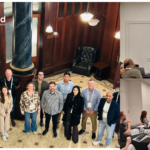With new businesses starting up every day, the hiring environment has become very competitive. So, how do you attract new staff, especially entry-level employees, to work in your firm?
The answer is complicated. Everyone is different… and the concept of employment is evolving fast. We asked some young professionals for THEIR views.
Businesses need people to serve Clients and grow. This requires ‘recruitment’ which can take many forms like hiring full or part-time, subcontracting, and offshoring.
Whatever the approach, a recruitment strategy should help the business to stand out from other options candidates are considering. This is especially important when fewer graduates are entering the profession and attitudes to work are evolving.
We asked some recent graduates (located in the USA, Canada, and Australia) what attracts them to businesses as potential employers and to provide some examples.
Here’s a summary of their feedback.
An Employer with Resilience
A majority of graduates said they want to ‘avoid employment uncertainty’, especially when beginning their careers. They prefer to ‘find their feet’ in their first role and MAY consider more ‘risky’ employment options later.
Lesson: A business that shows it has weathered (or even thrived) in tough times (without reducing the team) will be attractive to job seekers.
Example: A Miami-based firm states clearly (on their website and in interviews) how they have emerged stronger through recent economic challenges, not only by hiring but also by completing an acquisition. The CEO and founder describes this journey and aggressive growth plans to give confidence in the future of this business.
An Employer which Stands Out
A challenge in many industries is to stand out from the competition. Differentiation can take many forms including services, Clients, working conditions or culture.
Lesson: Address the question. “How are we different?” throughout the recruitment process. You may not appeal to everyone… but are more likely to attract the candidates that will ‘fit’.
Example: A South Carolina firm emphasises “family values” as a differentiator. They describe how their business has thrived under three generations of the same family and mention many family businesses they serve. Another firm in Houston, Texas differentiates themselves based on a focus on the ‘entertainment industry’ as well as their ‘numerous celebrity Clients’.
An Employer Offering Attractive Compensation and Benefits
This will be a factor in swaying an applicant’s decision, especially when considering several job offers. However, applicants don’t just consider the annual compensation in the first year. Many will look at longer-term earning opportunities, like bonus plans, equity participation, and non-financial benefits.
Lesson: Take a flexible view on compensation. Know that it is important but will mean different things to different candidates based on their ambitions. Tailor packages which will make sense to your target employees.
Example: A business in Seattle, Washington offers a ‘path to partnership’ program in which employees can enrol to receive guidance and training to prepare them for partnership. Although a small percentage actually go on to partnership, this can be appealing to job seekers.
An Employer which is Flexible and Responsive
Your business may be on the smaller side (revenues, number of employees, etc.) compared to employers in other industries. But this can be an advantage. A small business can easily design attractive compensation plans, provide exposure to a wide range of duties and be flexible on employment policies. (Compare this to large firms, which can be impersonal and inflexible).
Lesson: Emphasize that you are flexible as an employer (while still maintaining good processes and discipline).
Example: A firm in Chicago, Illinois advertises their considerable flexibility on Work from Home and Flexible Working Hours while also maintaining a convenient office for staff who need those facilities.
An Employer which Offers Advancement Opportunities
Career advancement can mean formal training. It can also mean exposure to new opportunities in a growing, dynamic business which will offer new management positions in the near future. A clearly-defined career path is attractive… but some candidates will recognize that the best and fastest advancement arises in ambitious firms which take on interesting and challenging projects.
Lesson: Demonstrate how people learn in your business both through your professional development activities and because of your bold, innovative approach.
Example: A business in Sydney, Australia has a track record of buying other firms and plans to continue growing by acquisition. When recruiting, they emphasise the opportunities to lead new, challenging projects, help integrate acquired firms and relocate to different offices.
A Successful Employer
Success means different things to different candidates but most want to feel proud of their association with their employer. Growth is an obvious indicator of success but other factors include a good reputation, significant Client engagements, industry leadership, prominent partners, a track record of innovation, and community service projects.
Lesson: Highlight your accomplishments, especially those which help you to stand out.
Example: A firm in Boston, Massachusetts was commissioned a large government contract in the healthcare sector. This led to establishing a leadership position in a complex area of that industry. One partner is an advisor on various government panels while another has published papers in this area.
An Employer which Takes a Long-Term View
In some industries, businesses have short-term horizons, including the ‘exit’ of the founders as the business transitions to new owners. This can be appealing and exciting but is not ‘normal’ in professional services. A firm that hires entry-level candidates so they can be groomed for long-term success in a growing, vibrant, stable organization is likely to be attractive.
Lesson: Emphasise long-term commitment to employees since this will attract more loyal employees who want to develop their skills as the firm grows.
Example: A business in Melbourne, Australia commits to (partially) funding tertiary education for certain employees, especially with a business focus (like an eMBA). This develops skills, increases retention, and attracts employees who want to continue investing in their education.
How does your business stack up on these criteria? A small tweak in your messaging may yield significant results.
If you’re looking for comprehensive financial advice, our team is here to help. Contact DFK Everalls today and for ideas to help you achieve your financial goals.







